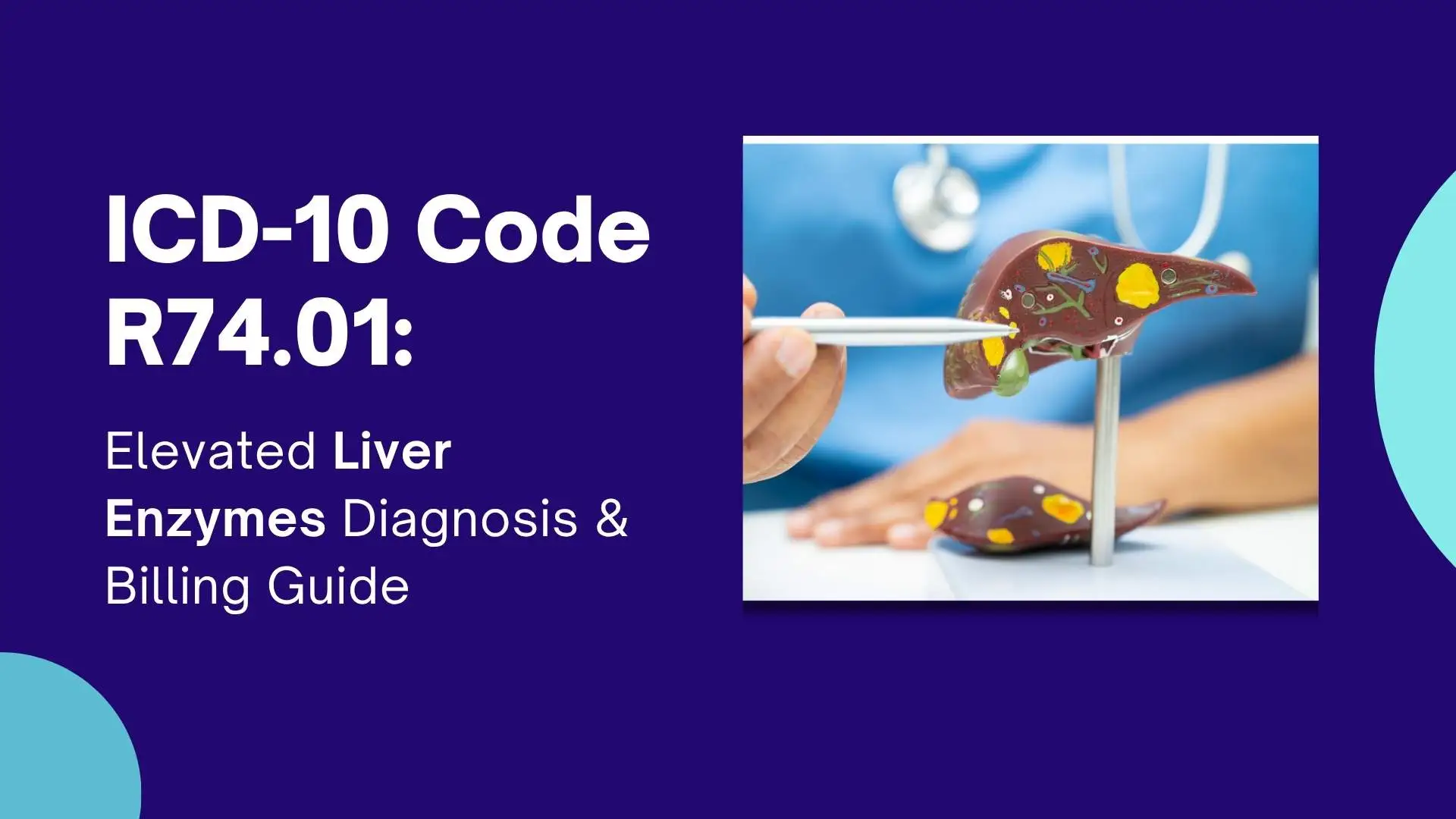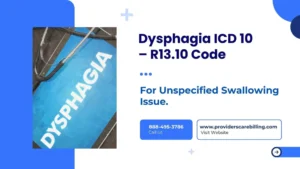An elevated liver enzyme level is often detected during regular health screenings. Do you know about this? These results, which are commonly puzzling for patients and essential for providers, can indicate anything from minor liver stress to significant illness. If you work in a medical profession that might handle those kinds of cases, you’re already familiar with billing and coding. And that’s where knowing the ICD-10 code for elevated liver enzymes comes in handy, which for this purpose is R74.01 becomes essential.
Not surprisingly, correct medical coding is more than a technical necessity — it also fosters clear communication with insurance companies, adequate patient care, and adherence to the law. This post will lift the veil from ICD-10 R74.01 and its significance, including guidelines for proper billing and coding to help you make it easier and to keep you from getting into trouble.
What Are High Liver Enzymes?
Liver enzymes are proteins made by your liver that assist with its normal functions, including metabolizing toxins, producing bile, a nd metabolizing nutrients. Inflamed or injured liver cells cause the liver enzymes to leak into the bloodstream.
Its detection in the blood is carried out through measurement of these enzymes:
· ALT (Alanine Aminotransferase): Elevated ALT can indicate damage to liver cells.
· AST (Aspartate Aminotransferase): An increased AST indicates damage to the liver or muscles.
· ALP (Alkaline Phosphatase): Increased ALP may be a sign of problems with the bile ducts or bone diseases.
· GGT (Gamma-Glutamyl Transferase): High GGT is associated with issues of the bile duct.
Some of the most frequent reasons for elevated liver enzyme levels are:
· NAFLD (Non-Alcoholic Fatty Liver Disease)
· Alcohol-related liver disease
· Hepatitis (viral or autoimmune) Editor’s note Related post: What is hepatitis?
· Liver-toxic medications (such as statins or acetaminophen)
· Metabolic disorders
Because the miracle of medicine is predicated upon the ability to diagnose and effectively treat based on this diagnosis accurately, you must capture and document these findings correctly, a nd ICD-10 coding is the crux of this pivotal balance.
What Is ICD-10 R74.01?
The ICD-10 code R74.01 means your liver enzymes are high. It applies explicitly when abnormal liver function test results are obtained by medical testing, yet a diagnosis has not been established. It’s this code that informs reimbursement claims, clinical documentation, and serves the purpose of monitoring patient care statistics.
The term transaminitis icd 10 is most commonly captured under the code R74.01 when no specific liver disease has been diagnosed yet.
When Should You Use the Code?
You should use R74.01 when:
· A patient has a liver function test done, which reveals high levels of enzymes.
· The elevation is clinically significant, although with no correlation with any particular liver disease until now.
· An etiology test is pending in order to identify the cause.
The purpose of R74.01 is not to create a diagnosis in itself, but to record a finding that needs to be investigated.
A Real-Life Example
Here’s a real-life example to illustrate how you can use ICD-10 codes in action:
Sarah, a 45-year-old marketing professional, comes to you complaining of fatigue and abdominal pain. Routine blood tests have raised ALT and GGT, requiring extended liver function tests. Although the doctor suspects NAFLD, the diagnosis needs to be confirmed with imaging. She is currently being billed and documented using ICD-10 R74.01 for billing purposes.
This cautious, yet organized method, not only aids in healthcare compliance, but also guarantees her insurance will pay for further testing.
Common Causes and Associated Conditions with Elevated Liver Enzymes
Elevated liver enzymes can often be found alongside other metabolic issues like prediabetes. Learn how to document and bill it properly using ICD-10 Code R73.03. The detection of increased liver enzymes with the help of the ICD-10 is also associated with the treatment of several accompanying diseases. Some common associated conditions include the following:
Non-alcoholic Fatty Liver Disease (NAFLD):
One of the major causes of high liver enzymes, associated with metabolic syndrome and obesity.
Alcohol-Associated Liver Disease:
The liver can suffer long-term damage if heavy drinking is continued.
Viral Hepatitis:
Hepatitis B and C also often cause elevated AST/ALT.
Autoimmune Liver Diseases:
Autoimmune hepatitis or primary biliary cholangitis (PBC) are conditions that often raise ALP.
Drug-Induced Liver Injury:
Liver inflammation and injury can sometimes occur in response to the use of statins and antibiotics.
A knowledge of the disease processes can lead to improved diagnosis and patient discussion, and correct coding.
FAQs
Nowadays ICD-10 code is more popular.R74. 01 and R73. 0?
R74.01 refers to abnormal liver function test results, while R73.0 refers to irregular glucose levels.
Can high liver enzyme levels go back to normal?
Yes. Enzyme levels can return to normal with appropriate treatment, such as diet, cessation of alcoho,l or regluated intake of medications.
What if you have high liver enzymes as a result of a known disease?
If the disease that is causing the disturbance is known (i.e., Hepatitis C or NAFLD), then code the specific diagnosis rather than R74. 01.
Do we have periodic checks on liver enzyme tests?
Yes, ALTs and ASTs are typical test parameters on a standard blood panel.
How Providers Care Billing LLC Can Assist You with Medical Billing and Coding
Medical billing is complex. Knowing when to apply codes such as ICD-10 R74. 01 requires accuracy, skills, and current knowledge of new changes in laws. That’s where Providers Care Billing LLC comes in.
Located in Illinoi,s USA company Providers Care Billing LLC offers services that are medical billing and coding services for less money, 2.89%. With a super 4.9-star rating and more than 100% client satisfaction, our professional staff is committed to streamlining your billing processes, cutting down on erro,rs and ultimately, helping you get paid faster.
Why Choose Providers Care Billing LLC
Below are some key reasons why Providers Care Billing LLC has become the choice of hundreds of small and large businesses for all their billing needs.
Great Value: With a premium rate of 2.89% you receive high value for a low price!
Relevant Experience: Our reputation precedes us, and we have 100% client satisfaction and a a4.9-starr status to show for.
Personalized Service: We focus on customizing our services to reflect what your practice needs.
Here’s what our customers have to say:
“Providers Care righted our billing ship. They are ICD-10 trained, and that means it is right every time!” – Dr. Jessica T., Illinois.
“Finally – a billing service that is what it claims to be. This service is dependable, legitimate, and low-cost.” – Dr. Michael L., California.
Streamline ICD-10 Billing Now
Correct ICD-10 coding, which should include R74.01, could help to lower claim rejections and streamline your practice. Trust Providers Care Billing LLC and let the experts deal with your billing, so you can concentrate on giving your patients the best care possible.
Call us today to find out more or to get you going at an industry-low rate of 2.89%!




